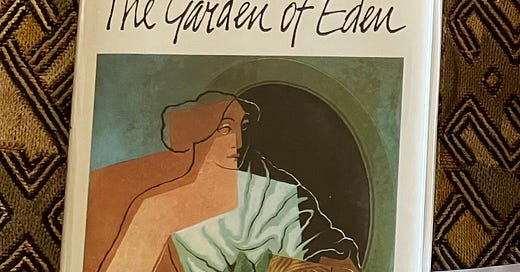You have to hunt hard to find redeeming value in Hemingway's "The Garden of Eden," a book published twenty-six years posthumously, expertly excerpted from a much, much longer manuscript that Papa toiled over immediately after World War II. But there is value in it, and not only for some of the disgust you might feel in several uneasy spots. Also credit the author for making you feel glad you're not a part of all this, which is about as moralizing as he gets.
But the setup is an ever-evolving gender dysphoria difficulty in an extended honeymoon, and that’s where the story becomes more relevant to our time. A husband and wife of considerable means take their luxury moon on the French Riviera and in the heart of Spain in the spring and summer of 1927. The novel also features a short story set within it: the protagonist is working on a piece featuring a hunting safari in Tanzania, now Tanganyika, unfolding in the protagonist's childhood.
The protagonist's wife, named Catherine and pet named "Devil," is an unhinged rich girl in considerable gender trouble. The trouble is easier to manage when she goes full gamine and starts to dress like boys, even identifying as a boy on some days (recall, this was written in the 1940s, which makes it . . . socially illicit to the time). Things begin to gang aft agley when the couple's matching haircuts attracts the attention of a beautiful bi heiress (named Marita, pet named "Heiress") back at the hotel bar. An extremely uneasy menage-a-trois subsequently unfolds, with the original couple often pretending to accede to it all, but just as often caving to jealousy and bitchiness. Heiress for her part remains dark and fresh and sunny and pleasant, a sleek seal merrily flapping her way through the angry waters.
Devil is annoyed by husband's work, perhaps jealous of it (most commentators insist she is, but I don't think it's jealousy, I think it's open revulsion), and she increasingly expresses her annoyance until it culminates in a potlatch of sorts that's better left to readers making it that far.
Truth is, I enjoyed the book for its unusual blending of a familiar age-old voice but with lush helpings of contemporary relevance – it felt like the very old 1920s Hemingway working the rooms of the 2020s. It is certainly also miles ahead of the 1940s when it was written, as well as the 1980s when it was published. (It does read mostly like a cautionary tale, but all Hemingway is really that.)
I kept shuffling through my favorite Hemingway biography (Kenneth Lynn's) to see who he might actually be writing about and what was happening on his 1927 honeymoon with Pauline Pfeiffer – whose uncle set up and paid for Hemingway's touchstone safari, the one on which he based "Green Hills of Africa." (Devil, it turns out, bears more resemblance to Hadley Richardson than to Pauline, but remains a composite.) Unlike any part of that book, there are indications of profound regret for hunting safaris in this one.
Gender trouble, of course, took up considerable psychic space in Hemingway's private life. If you're recalling or wondering, Gloria / Gregory Hemingway, one of Papa's children, transitioned after Hemingway's death. But the transition isn’t even half the tale. In 1951, Gregory (when still known as Gregory) dressed in drag, entered a woman's restroom in a movie theater in LA, and was arrested; his mother Pauline flew to LA to console Gregory, and told Ernest about the arrest; they argued, mostly about who caused this to happen; and Pauline, who likely suffered from adrenal cancer but did not know it, died of a stress-induced malady the next day. Gloria spent the rest of her life assigning blame and resolving gender; she died decades later, a few days after one final arrest for lewd conduct.
The book all reads like true Papa; there's a drink on every page, and a conversational dying fall on half of them. I doubt you'll read it, but I thought you should know; and if you do read it, let me know! And visit the press’s about page for our own books.





great book. lovely summary.
After the train wreck with fireworks that was Islands in the Stream to my early '20s self, I eschewed all posthumous Hemingway other than A Moveable Feast. But it would seem from your review, and what I know about my nearing-70 self, that there's much more to late Hemingway than I was capable of grasping in my callow years. I think I'll take a look now.